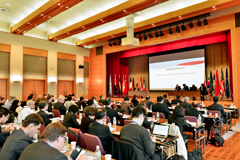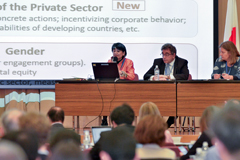T20 Inception Conference Held for Policy Recommendations to G20
2019.01.23
The two-day T20 Japan 2019 Inception Conference was held in Tokyo on Dec. 4 to 5, 2018, bringing together approximately 200 researchers from think tanks around the world.
Think20 (T20) is one of the Engagement Groups (groups formed according to agenda and function) of G20, and consists of think tanks and researchers providing policy recommendations to G20. Japan will assume the Presidency of the G20 Summit for the first time, which will be held in Osaka in June 2019. T20 Japan 2019 will also be hosted by international organizations and Japanese think tanks, such as Asian Development Bank Institute (ADBI), the Japan Institute of International Affairs (JIIA) and the Institute for International Monetary Affairs (IIMA).

The Inception Conference brought together approximately 200 researchers from around the world
This Inception Conference was the first event for the T20 Japan 2019 term. Plenary sessions were held on the 4th, and sessions by each of the ten task forces were held on the 5th. The JICA Research Institute (JICA-RI) is coordinating Taskforce 1 "2030 Agenda for Sustainable Development (SDGs)" and Taskforce 5 "Cooperation with Africa."
In the morning of the 4th, Kenji Yamada, parliamentary vice-minister for Foreign Affairs of Japan, opened the event by expressing expectations for policy recommendations from T20, the G20's "idea bank." Asian Development Bank President Takehiko Nakao and JIIA President Kenichiro Sasae also made speeches.
Next, a panel discussion was held on the theme "T20: The Role of Think Tanks for G20." With Naoyuki Yoshino, dean of ADBI, serving as moderator, prominent and experienced scholars participated in discussions. Panelists pointed out the increasing role of the think tank community in promoting agreements through analysis based on scientific evidence regarding issues for which it is difficult to reach consensus in the politically oriented G20 framework. The discussions involved the audience as well, and the issue of how to increase the influence of T20 on G20 was raised.
In the afternoon of the 4th, IIMA President Hiroshi Watanabe gave his welcome remarks, followed by Koji Tomita, representative of the Government of Japan for the G20 Summit. Tomita expressed expectations for collaboration with T20, proposing that the priority of the G20 Japan 2019 should be to continue the successes of the Argentina G20 and to return to cooperation toward achieving sustainable growth.
Further, Yoshino introduced the ten task forces of T20, and Columbia University Professor Jeffery Sachs sent a video message to attendees, followed by a panel discussion on the theme "Sustainable Development and Inclusive Growth." JICA-RI Director Izumi Ohno served as a panelist.
First, Dennis Snower, president of the Kiel Institute for the World Economy, who served as moderator, commented on the question of what actions think tanks can take to cooperate with multiple countries toward achieving the SDGs. He said we need a paradigm change that recouples four different aspects of sustainability: economic, environmental, political and social sustainability.

JICA-RI Director Izumi Ohno (far left) served as a panelist
Ohno pointed out that it is important to begin from a solid action, then introduced Japan's efforts on the SDGs. She explained that the Japanese government launched the Sustainable Development Goals (SDGs) Promotion Headquarters in the Prime Minister's office and established eight priorities, including both domestic and foreign issues, aimed at building Japan's unique SDGs model. She said JICA would seek to utilize Japan's development experience toward aid to developing countries, thereby contributing to the resolution of global and local issues. In addition, as a co-chair of Taskforce 1 "2030 Agenda for Sustainable Development (SDGs)," Ohno said that the important perspective of this task force is that “no one is left behind.” She explained that the task force will narrow down policy recommendations to five areas: universal health coverage (UHC), education, global institutional and/or financing issues, the role of the private sector and gender. She closed her speech by emphasizing the importance of a human-centered approach, the utilization of a network of experts, cross-cutting perspectives, as well as continuity and innovation.

事業事前評価表(地球規模課題対応国際科学技術協力(SATREPS)).国際協力機構 地球環境部 . 防災第一チーム. 1.案件名.国 名: フィリピン共和国.

事業事前評価表(地球規模課題対応国際科学技術協力(SATREPS)).国際協力機構 地球環境部 . 防災第一チーム. 1.案件名.国 名: フィリピン共和国.

事業事前評価表(地球規模課題対応国際科学技術協力(SATREPS)).国際協力機構 地球環境部 . 防災第一チーム. 1.案件名.国 名: フィリピン共和国.

事業事前評価表(地球規模課題対応国際科学技術協力(SATREPS)).国際協力機構 地球環境部 . 防災第一チーム. 1.案件名.国 名: フィリピン共和国.

事業事前評価表(地球規模課題対応国際科学技術協力(SATREPS)).国際協力機構 地球環境部 . 防災第一チーム. 1.案件名.国 名: フィリピン共和国.